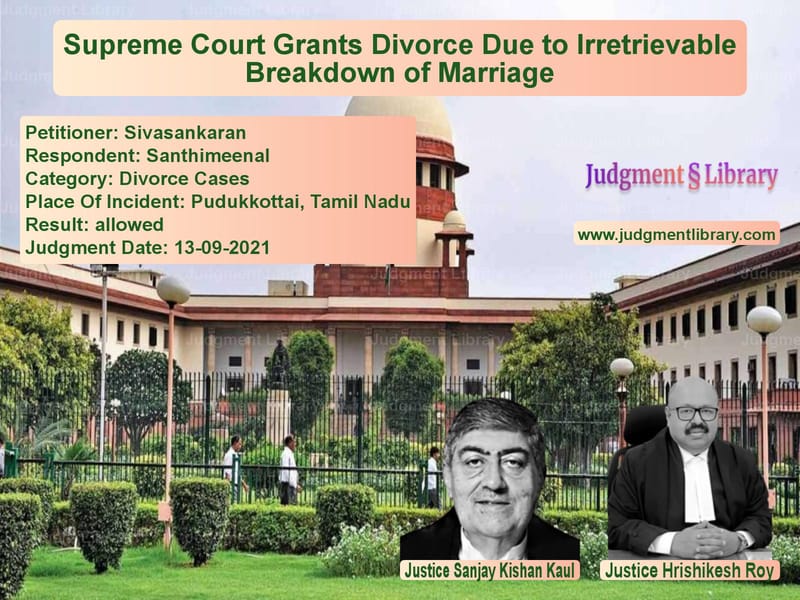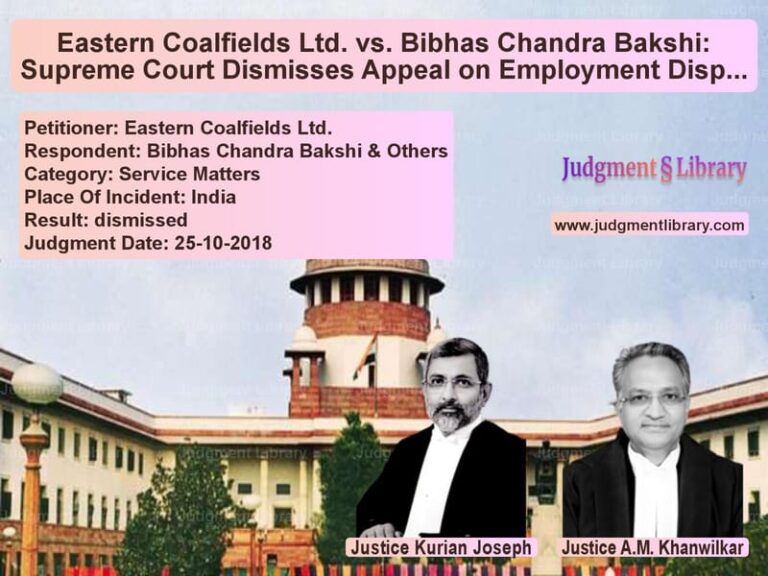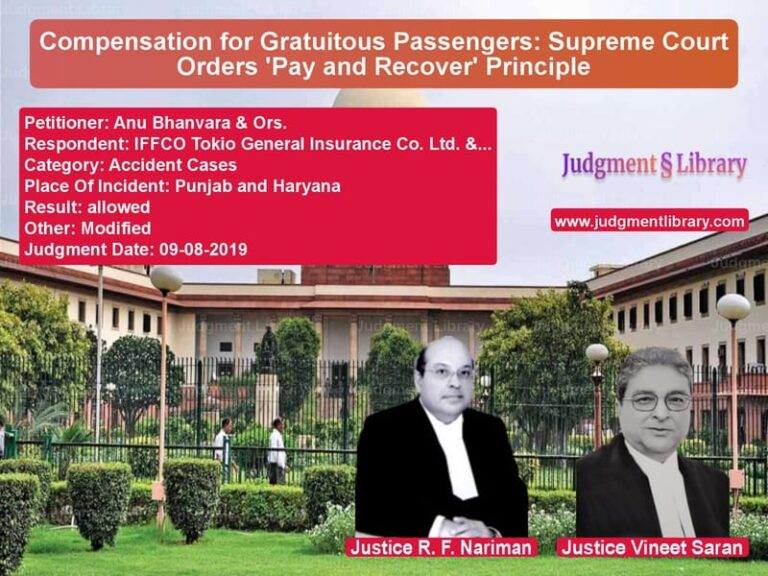Supreme Court Grants Divorce Due to Irretrievable Breakdown of Marriage
The Supreme Court of India, in the case of Sivasankaran vs. Santhimeenal, granted a decree of divorce on the grounds of irretrievable breakdown of marriage and cruelty. The Court exercised its powers under Article 142 of the Constitution of India, stating that the marriage had not worked since its inception and there was no possibility of reconciliation.
Background of the Case
The appellant-husband and the respondent-wife married on February 7, 2002, following Hindu rites and customs. However, their marital relationship never took off. According to the appellant, the respondent claimed she had been coerced into the marriage and left the marriage hall on the same night. Despite efforts from the appellant’s relatives to reconcile, she refused to cohabit with him. The marriage was never consummated.
On February 25, 2002, the appellant issued a notice seeking divorce under Section 13(1)(i-a) of the Hindu Marriage Act, 1955, citing cruelty. In response, the respondent filed a petition for restitution of conjugal rights, alleging that the appellant and his family had demanded dowry and refused to allow the consummation of the marriage. The appellant subsequently filed for divorce in March 2003.
Read also: https://judgmentlibrary.com/supreme-court-allows-delay-in-divorce-appeal-under-special-marriage-act/
Legal Proceedings
1. Trial Court’s Decision
After a trial lasting nearly five years, the Trial Court granted a decree of divorce on March 17, 2008, on the grounds of irretrievable breakdown of marriage. Within six days of this order, the appellant remarried.
2. Appeal to the District Court
The respondent challenged the Trial Court’s ruling before the Additional District Judge, Pudukkottai. She argued that she had filed the appeal within the limitation period and sought to restore her marriage. The appellate court set aside the divorce decree and allowed the petition for restitution of conjugal rights.
3. Appeal to the High Court
The appellant challenged the District Court’s decision before the Madras High Court. After prolonged litigation, the High Court reinstated the divorce decree on September 14, 2018. The matter, however, did not end there. The respondent filed a review petition, arguing that neither the Trial Court nor the High Court had the authority to grant a divorce based on irretrievable breakdown of marriage. The High Court allowed the review petition and dissolved the marriage.
4. Appeal to the Supreme Court
Unhappy with the review order, the appellant approached the Supreme Court.
Supreme Court’s Key Observations
1. Marriage Never Worked Since Inception
The Supreme Court noted that the parties had been living separately for almost two decades and concluded that there was no possibility of reconciliation:
“We have little doubt that this is one marriage which has not worked and cannot work.”
2. Application of Article 142
The Court acknowledged that irretrievable breakdown of marriage is not a ground for divorce under the Hindu Marriage Act, 1955. However, the Court cited previous Law Commission reports and stated:
“In appropriate cases, this Court has granted divorce under Article 142 to do complete justice between the parties.”
The Court referred to various Law Commission reports (71st Report in 1978 and 217th Report in 2010) that recommended introducing irretrievable breakdown of marriage as a ground for divorce.
3. Impact of Second Marriage
The Court considered the appellant’s second marriage, which had been in existence for more than a decade, and noted that forcing the appellant to remain in a legally defunct marriage would be unjust:
“Living together is not a compulsory exercise. If a marriage does not work, there is no purpose in postponing the inevitable.”
4. Continuous Litigation Amounts to Cruelty
The Court observed that the respondent had filed multiple legal cases against the appellant, including:
- A writ petition seeking disciplinary action against the appellant, who was a professor.
- RTI applications to obtain details about the appellant’s employment and insurance records.
- Complaints to the college authorities and government departments seeking the appellant’s removal from his job.
- A criminal complaint under Section 494 of IPC (bigamy) against the appellant after he remarried.
The Court ruled that such repeated litigation amounted to mental cruelty:
“Where one spouse continuously subjects the other to legal harassment, it can be considered cruelty under Section 13(1)(i-a) of the Hindu Marriage Act.”
Final Judgment
The Supreme Court ruled:
- The marriage between the appellant and respondent stands dissolved.
- The divorce is granted under both Article 142 of the Constitution and Section 13(1)(i-a) of the Hindu Marriage Act.
- The parties shall bear their own legal costs.
Implications of the Judgment
1. Recognition of Irretrievable Breakdown as a Valid Ground
The judgment reinforces that prolonged separation can be a ground for divorce, even if one party does not consent.
2. Preventing Misuse of Legal Proceedings
The ruling discourages the use of repeated litigation to harass spouses.
3. Balancing Legal and Social Realities
The Court acknowledged that in cases where the marriage is completely broken, continuing legal ties only creates unnecessary hardships.
4. Strengthening Judicial Precedents
The judgment aligns with previous Supreme Court decisions where divorce was granted due to irretrievable breakdown of marriage.
Conclusion
The Supreme Court’s decision in Sivasankaran vs. Santhimeenal is a landmark ruling that affirms the Court’s power to dissolve failed marriages under Article 142. It emphasizes that where reconciliation is impossible, prolonging the marriage only results in unnecessary suffering. This judgment sets a strong precedent for similar cases and ensures that legal frameworks evolve in line with societal realities.
Read also: https://judgmentlibrary.com/supreme-court-resolves-matrimonial-dispute-through-settlement-agreement/
Petitioner Name: Sivasankaran.Respondent Name: Santhimeenal.Judgment By: Justice Sanjay Kishan Kaul, Justice Hrishikesh Roy.Place Of Incident: Pudukkottai, Tamil Nadu.Judgment Date: 13-09-2021.
Don’t miss out on the full details! Download the complete judgment in PDF format below and gain valuable insights instantly!
Download Judgment: sivasankaran-vs-santhimeenal-supreme-court-of-india-judgment-dated-13-09-2021.pdf
Directly Download Judgment: Directly download this Judgment
See all petitions in Alimony and Maintenance
See all petitions in Divorce by Desertion
See all petitions in Mutual Consent Divorce
See all petitions in Property Division in Divorce Cases
See all petitions in Judgment by Sanjay Kishan Kaul
See all petitions in Judgment by Hrishikesh Roy
See all petitions in allowed
See all petitions in supreme court of India judgments September 2021
See all petitions in 2021 judgments
See all posts in Divorce Cases Category
See all allowed petitions in Divorce Cases Category
See all Dismissed petitions in Divorce Cases Category
See all partially allowed petitions in Divorce Cases Category







